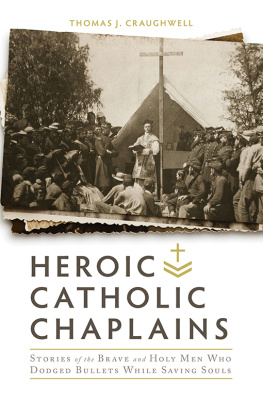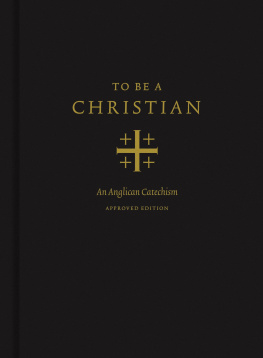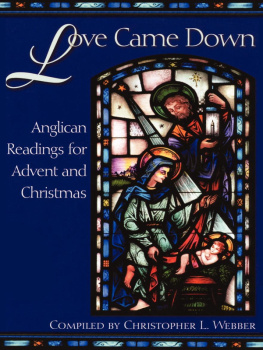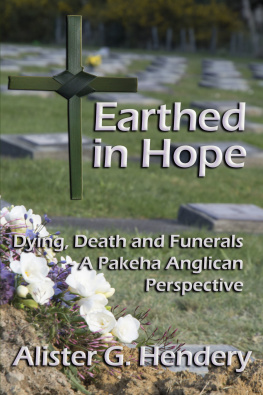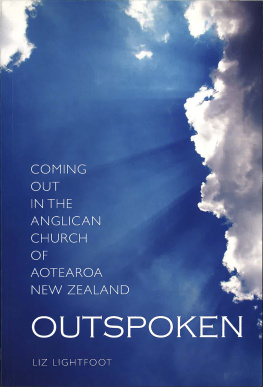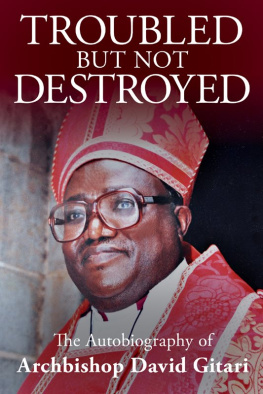Copyright 2010 David Hein. All rights reserved. Except for brief quotations in critical publications or reviews, no part of this book may be reproduced in any manner without prior written permission from the publisher. Write: Permissions, Wipf and Stock Publishers, 199 W. 8th Ave., Suite 3, Eugene, OR 97401.
199 W. 8th Ave., Suite 3
Manufactured in the U.S.A.
Cover photograph of St. Pauls Cathedral, London, January 1942, courtesy of the Imperial War Museum. The destruction caused by Nazi air attacks is softened by a dusting of snow.
Foreword
T he deepest significance of the past, writes the former archbishop of Canterbury Michael Ramsey, is that it contains reflections of what is eternal. Saintly men and women of any age belong to more than their own era: they transcend it. In Spiritual Counsel in the Anglican Tradition , David Hein and Charles Henery not only present this insight of Archbishop Ramseys (in the chapter A Pilgrims Journey); they also demonstrate its truth through the whole scope of their anthology. Saints necessarily exemplify their own time and culture, yet somehow they also stretch beyond these limits, living as they do on the eschatological edge of the kingdom. When holy men and women leave us some tangible part of their thought and prayer through their writings, our sense of the communion of saints is immensely deepened. The living and the dead meet as contemporaries, addressing one another across centuries.
Sometimes we find that part of the benefit in reading earlier authors lies in their very distance from us. Samuel Johnson could be none other than an eighteenth-century thinker, while John Donne reflects the English Renaissance at its best. And so the various Anglican authors contained in this volume, spanning four centuries and two continents, will challenge our characteristic assumptions simply by being people of their own times and placesgifted people, to be sure, but still products of their distinct historical contexts. After reading them, we may find we want to consider cultivating virtues admired in a previous era, but now out of fashion; these virtues may still be needful for us. Our horizons can be enlarged by fellow pilgrims whose outlook on God, on life, or on the Church is not quite our own, pressing us to examine our own perspectives afresh.
Every generation seeks some embodiment of the wonderful counselor Isaiah extolled. And in every generation, the grace of holy Wisdom resides in faithful Christians of exceptional discernment. Here the reflections of what is eternal may show up as counsel that is consistently apposite. While books cannot entirely substitute for personal guidance, they can help steer us through the sometimes rough and confusing terrain of the soul when access to face-to-face pastoral care may be limited by geography or other circumstances. Even when we enjoy sound mentoring, these authors continue to educate us in the ways of the Spirit. Spiritual Counsel in the Anglican Tradition draws upon sage representatives of the Anglican family, some of whom are well-known figures, while others are more obscure.
As we become more acquainted with them, we will probably wish to delve into the writings of those who address us most helpfully and pointedly; and if we are driven back to the sources, this collection of diverse writings will have been all the more successful in its pastoral goal. The topicalnot chronologicalgrouping of these selections underscores our solidarity with every generation that aspires to maturity in Christ, and it assists the reader who wishes to pursue a particular avenue of thought. As in a good conversation, words need to be punctuated by thoughtful silence. I suggest using these texts as a form of lectio divina , reading no more than a selection or two a day, meditating on them, pondering their practical application, and finally allowing them to serve as a springboard for prayer.
The sections that deal with our corporate sacramental life, the mystery of Christ experienced through the round of the church year, and aspects of personal prayer all strengthen these essential foundations of Christian discipleship. Yet Anglican pastoral thinking has never focused exclusively on worship and prayer as the sole domain of the Spirit. On the contrary, Anglican spirituality characteristically seeks a robust sanctification of the ordinary, so that God may be glorified in all things (1 Pet 4:11). Hence we find the Anglican counselors in these pages concerned with such mundane matters as friendship, the care of children, marriage, money, work, art, aging, animals, and the created order. Nothing in our lives is to be untouched by grace. We need the integrative wisdom of these Anglican forebears to see how, even in the microcosm of our lives, in Christ all things hold together (Col 1:17).
Julia Gatta
The School of Theology at the University of the South
Sewanee, Tennessee
Preface
T he stream of spiritual conversation that flows in these pages represents the confluence of three tributaries. First, almost twenty years ago, there was my little collection Readings in Anglican Spirituality , which Forward Movement Publications brought out in 1991. Professors may sneer at mass-market trade publishers and eschew get-rich-quick publishing schemes, but they are secretly pleased when their books appear in hundreds of academic libraries.
Readings made it into about the same number of institutional libraries as the total number of fingers that I have on my two hands. Nevertheless, the general response was gratifying because that slim paperback appeared to connect with the audience it was specifically aimed at: harried, frequently confused Christians or would-be Christians in search of spiritual knowledge and guidance. The first book I had worked on which tried to reach a non-academic audience of ordinary Christians, Readings was read and appreciatedI was pleased to hearby enough people to make me feel that this departure from the accustomed path of scholarly publication had been worthwhile. Ever since, I have regularly tried to address both professional and lay audiences.
Inspired to continue tapping this rich vein of Anglican literature, I came across additional material from the past four centuries which looked as if it too might nourish the hearts, minds, and souls of hungry Christians. Some outstanding passages were found in places where a reader would expect to come upon great advice in fine language, such as the essays of the brilliant conversationalist and man of letters Samuel Johnson. But other good material was discovered in places where an informed, perhaps jaded, Anglican would never expect to encounter wise thoughts in powerful prose: the annual convention addresses of bishops of the Episcopal Church. Starting in the 1940s, the Right Reverend Noble Cilley Powell regularly gave his people in the diocese of Maryland reasons to listen to what he had to say.
This valuable new material found its way into a seriesSpiritual Counsel in the Anglican Traditionthat I edited for the Anglican Theological Review in the 1990s. Published with the hearty encouragement of the journals editor-in-chief, the theologian Jim Griffiss, this series is also largely represented in the pages that follow.
In the meantime, other collections of Anglican spiritual writings have appeared. Perhaps the bestat least the one that I turn to most oftenis Richard H. Schmidts Glorious Companions: Five Centuries of Anglican Spirituality (Eerdmans, 2002). One reason for producing such books is the desire to deepen the spirituality of those who are already within the Church. But undoubtedly another reason is the wish to make it clear to twenty-first-century readers that a viable alternative to Im spiritual but not religious does exist: Im spiritual in the original meaning of spiritualspiritual within a long religious tradition and within a specific religious community.


